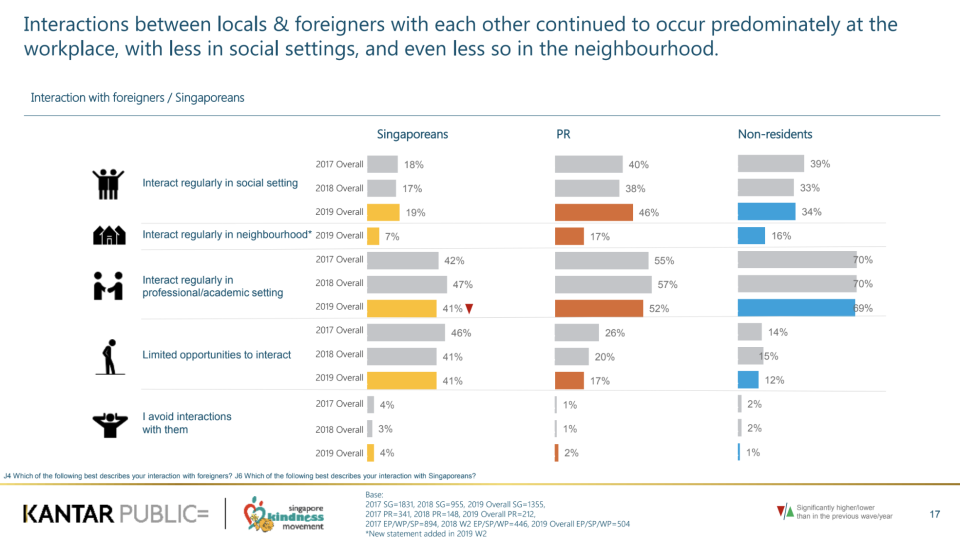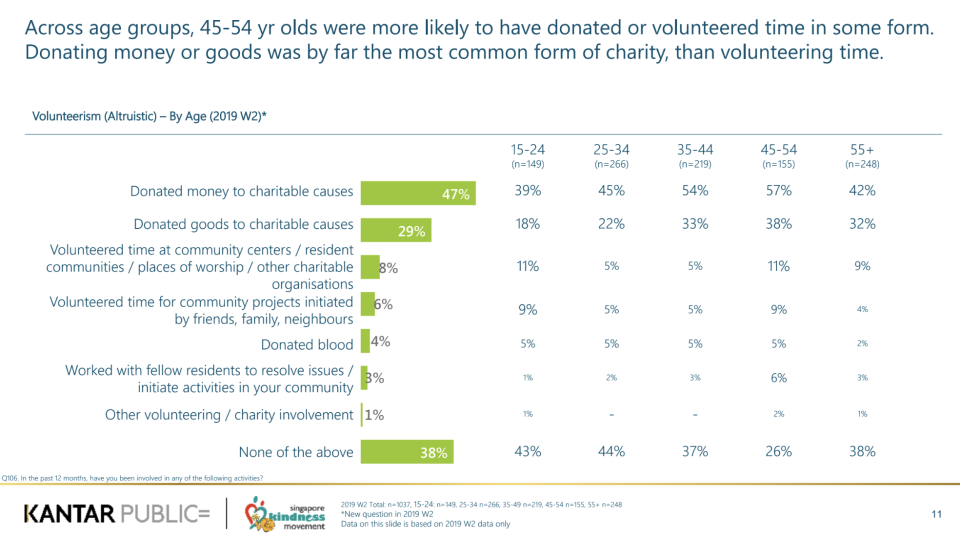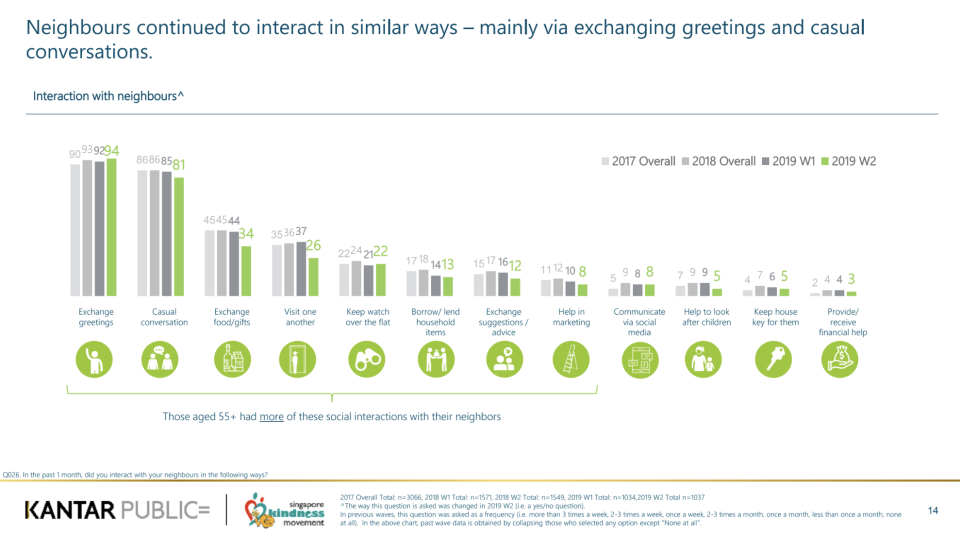19% of Singaporeans interact regularly with foreigners in social settings: survey

SINGAPORE — When it comes to mixing regularly with foreigners, Singaporeans appear to be more reserved compared with permanent residents (PRs) and non-residents.
One-fifth of Singaporeans (19 per cent) interact regularly with foreigners in a social environment, according to the latest Graciousness Survey by the Singapore Kindness Movement (SKM).
When it comes to interaction in the neighbourhood, the proportion of Singaporeans who interact regularly with foreigners is far lower at seven per cent, findings released on Monday (24 June) showed.
In contrast, PRs and non-residents have considerably more regular interaction with Singaporeans in social settings, at 46 per cent and 34 per cent of the total, respectively.
Similarly, they are more likely to mingle with Singaporeans in the neighbourhood at 17 per cent for PRs and 16 per cent for non-residents.
The level of interaction is much higher in the professional and academic settings across the three segments.
About 41 per cent of Singaporeans - a drop of six per cent from last year’s findings - interact regularly with foreigners in professional or academic settings. In comparison, 52 per cent of PRs and 69 per cent of non-residents do so in the same settings.

“It's natural. I mean, frankly, we spend more time seeing each other at work anywhere else, even at home, we don't see our own family members,” said Dr William Wan, SKIM’s general secretary.
When asked by reporters about how to improve interactions between Singaporeans and non-Singaporeans, Dr Wan said that companies could look into providing more conducive spaces within offices for casual social interactions.
This could mean having a common pantry area or a space where employees can gather and chat.
“I also think it's also a function of how companies’ corporate culture can improve. So that it's not all about task orientation, transactional relationships, but about - as we do in the SKM - trying to create friendship among fellow workers and colleagues and so on.”
Fear of looking silly
The annual survey, conducted since 2008, also found that while youths aspire in making Singapore a gracious society, about one in four (23 per cent) aged 15 to 24 fear “looking stupid or silly”.
This fear of embarrassment remains the highest among youths compared with the other age groups - 25 to 34 years old (12 per cent), 35 to 44 years old (11 per cent), 45 to 54 years old (14 per cent) and 55 years old and above (six per cent).
Their concern is strongly influenced by the power of social media, where an uploaded video of their act of kindness may potentially be misconstrued by online audiences, said a representative from social research company Kantar Public, which was commissioned by the SKM to conduct the survey.
Across the board, an average 10 per cent cited potential online mockery as a deterrent to helping others.
To combat their fear of embarrassment, the SKM will continue to build on its Be Greater campaign, launched in July last year. The campaign features people who share their experiences on their acts of kindness.
“It doesn't matter whether you are European, American, Canadian or Japanese - we are all the same. We all need a little bit of nudging, provided it’s done graciously,” said Dr Wan.
Conversely, older folks are more concerned about their ability or capacity to help effectively, with over one in three (35 per cent) citing that as a barrier to helping others.
This figure is higher than those in the other groups: 15 to 24 years old (28 per cent), 25 to 34 years old (26 per cent), 35 to 44 years old (24 per cent), and 45 to 54 years old (25 per cent).
The survey also found that in the area of volunteerism, far more respondents were involved in donating money or goods to charitable causes compared with volunteering time as well as working with fellow residents to resolve issues or initiative activities in the community.
Across the age groups, more than one in two (57 per cent) aged 45 to 54 years old donated money to charitable causes, higher than the average of 47 per cent.
They were also the most likely to donate goods, with more than one in three (38 per cent) reportedly doing so, compared with the average of 29 per cent.

Happy with neighbours, limited interactions
Over eight in 10 respondents are also satisfied with their neighbours, with the level at 88 per cent for Singaporeans and PRs and 85 per cent for non-residents.
Most of the interactions between neighbours are limited to exchanging greetings or casual conversations. Only about three to five per cent allow neighbours to help look after the children, keep their house keys or provide/receive financial help, in the month before they were surveyed.
While not many desire proactive interaction with their neighbours or go out of the way to make friends, they expect respect, peace, and acknowledgments of each other's presence, said the Kantar Public representative.

The top three things that respondents would like to see more are greeting each other when they meet, being able to rely on each other during emergencies, and showing considerations for others by keeping noise levels down.
The Graciousness Survey provides behavioural insights and indicators on graciousness and kindness in Singapore, leading to targeted initiatives that aim to make the Republic a nicer, more pleasant place to live in.
A total of 2,071 respondents took part in the survey via face-to-face interviews over two waves, from 7 August to 14 September last year and from 18 February to 17 March.
Of these, 1,355 Singaporeans, 212 PRs and 504 Employment Pass, S-Pass and Work Permit holders participated.
More Singapore stories:
Be more civic-minded by sharing tables, practising good hygiene: Singapore Kindness Movement
More Singaporeans willing to be living organ donors: NUH surgeon
Woman targets Singaporeans who 'chope' at eating places by placing message cards
Almost half of Singapore residents clear their food utensils at hawker centres: survey

